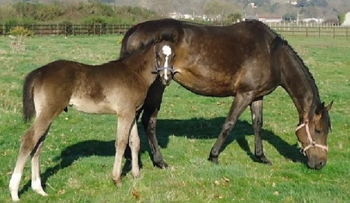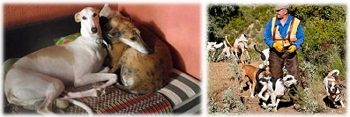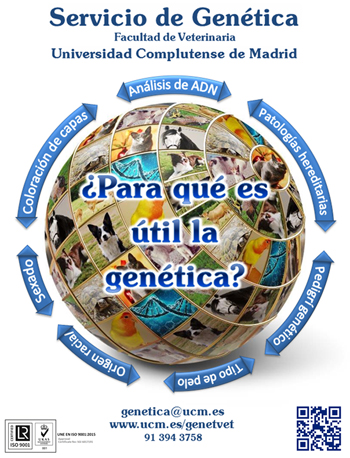ASSIGNMENT OF BIOLOGICAL SAMPLES TO KNOWN TAXONOMIC GROUPS
|
Description |

Foal with his mother
The common features of a group of individuals (physiological, genetic, morphological...) allow us to classify them in breeds, species, genus ... and, at the same time, differentiate between different groups. Belonging to one group or another, sometimes adds value to the individual intrinsically, as in the case of pets (belonging to a particular breed), by the value of production (Iberian pig, Galician or Asturian bovine breeds) or by its biological value (breeds of ponies, horses...). The genetic manipulation suffered by certain raw materials, mainly cereals, joined to the tendency that exists that such products should be identified, opens a wide range of application of these techniques in the identification of such manipulations.
|
How does it work |
The characterization studies of populations are commonly performed using genetic markers, which vary depending on the information we have of the reference population. For example, the microsatellite type markers is commonly used in populations where we have a priori information because they have already been the subject of other studies, or we can use RAPD type or AFLP markers in populations where no information is known.
The data obtained are useful to characterize the population from two points of view, first the resemblance among individuals within the population and secondly the differences with other populations.
|
Advantages |

Greyhounds and hounds
The identification of the common genetic characteristics of a group allows us to irrefutably confirm the classification of an individual. The animal's presence is not required because a sample thereof is enough (blood, hair.), which is important, especially in those products whose value is given by its origin (Iberian sausages, certain types of meats.). Without forgetting the importance in certain activities such as restocking with captive-reared individuals, or crosses, that can have a significant ecological effect.
|
Where has it been developed |

Genetic Service Image
The Genetic Service of the Veterinary Medicine Faculty of Madrid has developed a wide range of services offered in both pet and production animals. In this sense, some studies have been conducted in cows, horses, dogs, cats ... to genetically characterize certain populations, because of its economic or biological significance. Such is the case of studies for ASEAVA (Spanish Association of Selected Beef Cattle of Asturiana de los Valles Breed), ASEAMO (Spanish Association of Selected Beef Cattle of Asturiana of the Mountain Breed), or the genetic purity of red partridge.
The technological basis of this Genetic Service is supported by the research that the authors have conducted over the past 20 years and spread through numerous scientific publications in relevant journals, counting also with extensive experience in collaborations with companies and associations. They are part of the group "Animal Nutrigenomics" of the Animal Production Department, Faculty of Veterinary Medicine of the UCM, directed by Susana Dunner. This research group is included in the cluster of Agri-food and Health of the International Excellence Campus (CEI-Moncloa).
|
And also |
The Genetic Service at the Faculty of Veterinary Medicine of Madrid (Animal Production Department) offers support to veterinary activities in both small and large animals.
It has already been done different jobs in different breeds both pet and relevant production animals. Without forgetting the populations whose value is given by its importance to maintaining biological diversity.
|
Contact |
|
© Office for the Transfer of Research Results – UCM |
|
PDF Downloads |
|
Classification |
|
Responsible Researcher |
Javier Cañón Ferreras: genetica@vet.ucm.es
Department: Animal Production
Faculty: Veterinary Medicine


